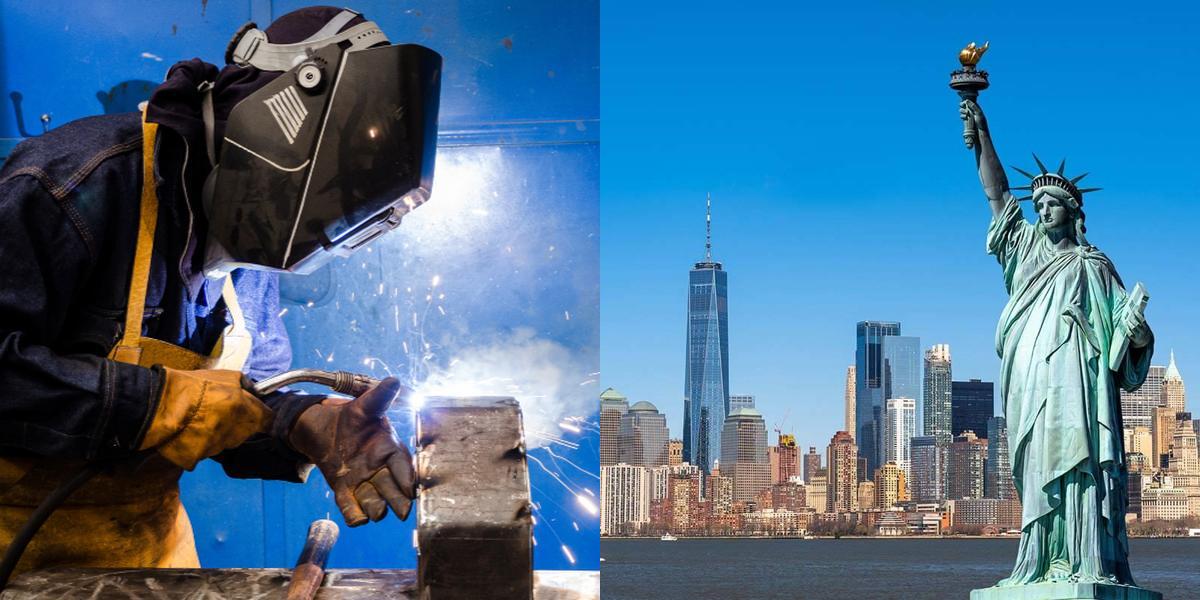How to Become a Welder in New York (2025)

Welders are skilled professionals who work with metal to fabricate and repair various structures and equipment. They use specialized tools and techniques to join metallic parts together, creating strong and durable bonds. Welders are responsible for interpreting blueprints, selecting materials, and ensuring the quality and accuracy of their work.
2. Network within the industry
Networking can be a valuable tool for finding job opportunities in the welding industry. Attend industry events, trade shows, and job fairs to connect with professionals in the field. Join welding associations or organizations, such as the American Welding Society, to further expand your network. Building relationships with industry professionals can lead to job referrals and potential employment opportunities.
3. Search for job openings
Utilize online job boards, company websites, and local classifieds to search for job openings in your area. Many welding companies also use social media platforms to advertise job vacancies, so make sure to follow them and stay updated. Consider reaching out to local welding companies directly to inquire about any potential job openings.
4. Prepare for job interviews
Once you secure an interview, it's important to prepare thoroughly. Research the company and familiarize yourself with their products or services. Practice answering common interview questions and be ready to demonstrate your welding skills if required. Dress professionally and bring copies of your resume and any supporting documents, such as your welder certification.
5. Gain additional certifications or skills
To stand out from the competition and increase your chances of getting hired, consider obtaining additional certifications or developing new welding skills. Specializing in specific welding techniques or obtaining advanced certifications can make you a more attractive candidate to potential employers.
6. Consider apprenticeships or entry-level positions
If you're having difficulty finding a job as a welder, consider applying for apprenticeships or entry-level positions in welding. These opportunities can provide valuable hands-on experience and allow you to further develop your skills. While the initial pay may be lower, it can be a stepping stone to more advanced positions in the future.
Remember to stay persistent and proactive in your job search. Follow up with potential employers after submitting your application and utilize any feedback you receive to improve your chances in future interviews. With dedication and perseverance, you'll find a job as a welder that aligns with your skills and career goals.
Career Paths and Opportunities after Becoming a Welder
Becoming a welder opens up a wide range of career paths and opportunities. Here are some options you can explore after obtaining your welder certification:
1. Construction welding
Construction companies often require welders to work on various projects, including building structures, bridges, and pipelines. Construction welding can involve working outdoors and often requires traveling to different job sites. It offers diverse opportunities and the chance to work on large-scale projects.
2. Manufacturing and fabrication
Many manufacturing industries, such as automotive, aerospace, and shipbuilding, rely on welders to fabricate and assemble metal components. Working in manufacturing and fabrication can involve operating specialized equipment and following precise specifications. It offers stability and the opportunity to work with cutting-edge technology.
3. Pipe welding
Pipe welding involves joining pipes of various materials and sizes, often used in industries such as oil and gas, plumbing, and construction. Pipe welders are in high demand due to the need for infrastructure development and maintenance. This specialization requires advanced skills and knowledge of specific welding techniques.
4. Underwater welding
For those seeking a unique and adventurous career, underwater welding may be an option. Underwater welders work in environments such as offshore oil rigs and underwater structures. This specialized field requires additional training and certifications, including diving qualifications.
5. Welding inspection and quality control
If you have an eye for detail and enjoy ensuring compliance with industry standards, a career in welding inspection and quality control may be a good fit. Welding inspectors are responsible for evaluating welds, conducting tests, and ensuring that welding procedures meet quality standards. This role often requires additional certifications and knowledge of welding codes and standards.
6. Teaching and training
After gaining significant experience and expertise in welding, you may consider a career in teaching or training. Many technical schools and community colleges offer welding programs and are in need of qualified instructors. Sharing your knowledge and skills with future welders can be rewarding and contribute to the growth of the industry.
How much does a Welder make?
The average salary for a welder can vary depending on factors such as experience, location, and industry. According to the U.S. Bureau of Labor Statistics (BLS), the median annual wage for welders, cutters, solderers, and brazers was $43,410 as of May 2020. The lowest 10 percent earned less than $30,860, while the highest 10 percent earned more than $64,240.
Starting salaries for welders can vary greatly. Entry-level welders with little to no experience may start at or near the lower end of the salary range. However, as they gain experience and develop their skills, their earning potential increases.
Final Thoughts
Becoming a welder can be a rewarding and fulfilling career choice. By obtaining your welder certification, you'll be equipped with the necessary skills and knowledge to excel in the field. Remember to continuously update your skills, stay current with industry trends, and explore different career paths to maximize your opportunities as a welder. With dedication and a passion for welding, you can forge a successful career in this in-demand profession.
If this article doesn't match what you're looking for, you can check out these other articles:

Fel is a student support representative who guides enrollees to the right program and answers their queries. She's committed to helping students and takes pride in her work. In her free time, she enjoys sightseeing and hanging out with loved ones.




